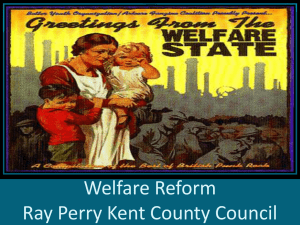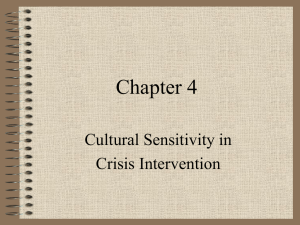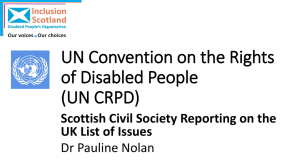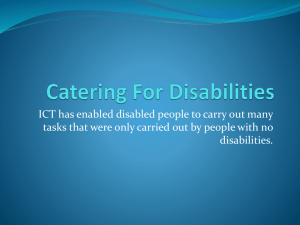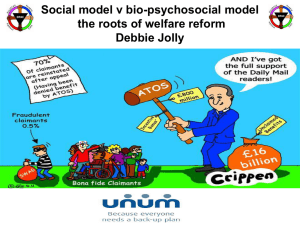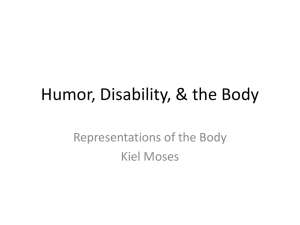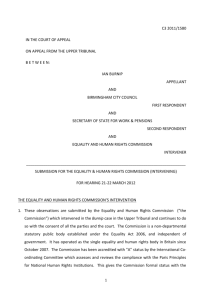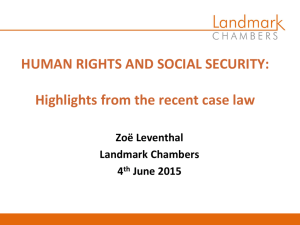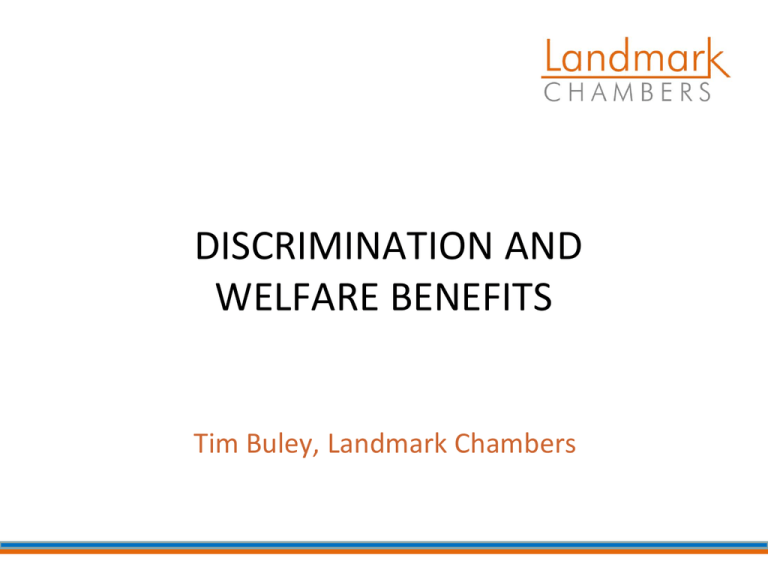
DISCRIMINATION AND
WELFARE BENEFITS
Tim Buley, Landmark Chambers
INTRODUCTION
• 2 recent cases illustrate the ways in which
discrimination arguments can be used to advance
the position of disabled people in the welfare
benefits context:
– Burnip v SSWP [2012] HRLR 20, [2012] EWCA Civ 629.
– R (MM) v SSWP [2012] EWHC 2106 (Admin).
• What were these cases about? How can they be used to take
forward the arguments further?
Burnip, Trengove and Gorry: Housing benefit for
the disabled and the ECHR
• The Issue:
Failure of housing benefit to make provision for extra rooms needed by
disabled persons as a result of their disability
• Facts:
– B and T: both severely disabled young people who required overnight carer,
who required somewhere to stay. B and T could claim housing benefit but, as
single people, only for a single room.
– G: Father of two young disabled daughters. Housing benefit eligibility limited
to one room for daughters. Their disabilities made this inappropriate, such
that, without an extra room, one or other might end up in care.
Burnip, Trengove, Gorry (continued)
• Article 14 ECHR:
The enjoyment of the rights and freedoms set forth in this Convention shall be
secured without discrimination on any ground such as sex, race, colour, language,
religion, political or other opinion, national or social origin, association with a
national minority, property, birth or other status.
• All social security benefits within the “ambit” of A14: R (RJM) v SSWP
[2009] 1 AC 311.
• Burnip now removes and doubt that “disability” is a “status” under A14.
Burnip, Trengove, Gorry (continued)
• Positive discrimination (Thlimmenos v Greece (2001) 31 EHRR)
– Potential problem was that, arguably, B, T and G were not asking to be
treated the same as another non-disabled person: they were asking to
be treated better, by being paid more money to allow for an
additional room.
– Burnip is first case in UK where a person has successfully argued for
better treatment, in reliance on ECHR. Court of Appeal held that there
the appellants had an “objective need” for an additional room.
• Justification: important part of judgment that SSWP could not explain why
it was reasonable not to make the extra payment, in part because he
argued that other public bodies should meet the expense.
Burnip, Trengove, Gorry (continued)
OUTCOME: WE WON (HURRAY!)
(THERE IS A PENDING APPEAL TO THE SUPREME COURT)
MM and KM: ESA and the duty to make
reasonable adjustments
• Employment Support Allowance (ESA) introduced in 2008 (for new claims)
and April 2011 (for migration of existing Incapacity Benefit claims).
• ESA very controversial:
– (A) Substantive entitlement conditions
– (B) Process, ATOS adjudication, decision making etc.
• Particular issues about claimants with mental illness, who are not well
placed to explain their condition or appreciate need for evidence:
– (A) Concerns about ATOS training in mental illness for “Healthcare
Professionals” (“HCPs”) who carry out interviews.
– (B) Need for medical evidence in support of claim, for various reasons
including:
• Claimants not able to explain own condition
• HCPs may not be able to evaluate mental illness without
independent evidence.
MM and KM (continued)
•
Equality Act 2010, “duty to make reasonable adjustments” in favour of disabled
persons (section 29 of the 2010 Act, re-enacts, but with changes, similar duty in
Disability Discrimination Act 1995).
•
Duty explained in section 20 of the 2010 Act:
... where a provision, criterion or practice of A's puts a disabled person at a substantial disadvantage in
relation to a relevant matter in comparison with persons who are not disabled, to take such steps as it is
reasonable to have to take to avoid the disadvantage.
•
Note (and see the Equality Act 2010 Code of Practice):
– (a) The duty is owed to disabled people generally (Code §7.19)
– (b) The duty is anticipatory (Code §§7.20-21)
– (c) The duty is continuing, so must keep policies under review (Code §7.27)
•
Important limitation: Cannot be used to challenge legislation, only policies and
practices
MM and KM (continued)
• The claim: The SSWP / ATOS must make reasonable adjustments when
considering claims for ESA by those with mental illness, or where claim
based on mental illness, including as follows:
– The responsibility for obtaining medical evidence in the case of persons with
mental illness lies with the DWP Decision Maker.
– In cases in which a claimant identifies himself as suffering from a mental health
condition, but does not provide medical evidence in support of the claim, he
should be contacted prior to being required to undergo an Atos assessment, and
invited to provide such evidence or nominate a chosen healthcare professional
from whom such evidence may be obtained. If he is unable to obtain that
evidence for himself, the DWP Decision Maker should contact the nominated
person.
– Evidence obtained should be considered in advance of the Atos assessment, to
consider whether a face to face assessment is required, or whether the person
can be awarded ESA without it.
MM and KM (continued)
OUTCOME: WE WON (HURRAY!)
UM, SORT OF, THE FIRST ROUND:
PERMISSION GRANTED AND CASE TRANSFERRED TO UPPER
TRIBUNAL
Full hearing in January 2013
ARTICLE 14 AND THE EQUALITIES ACT:
COMPARE AND CONTRAST
•
In common, both can now be seen to involve “positive” discrimination in some
circumstances.
•
Article 14
– Main benefit of Article 14 is that it can be used to challenge (primary and
secondary) legislation
– Main disadvantage is that it is relatively “weak”: government only has to show
very limited “justification” for differences in treatment, at least in the social
security / social welfare field
•
Equality Act and “reasonable adjustments”:
– Main limitation: cannot be used to challenge legislation, only “practices”
– Main benefit: Must “stronger”. Court is primary decision maker as to what
adjustments it would be “reasonable” to make (R (Gill) v Secretary of State
for Justice [2010] EWHC 364 (Admin), and see Code §7.33).
DISCRIMINATION AND
WELFARE BENEFITS
Tim Buley, Landmark Chambers




